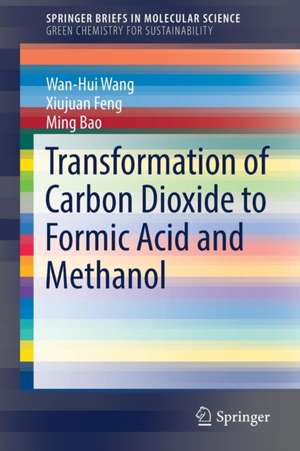Transformation of Carbon Dioxide to Formic Acid and Methanol: SpringerBriefs in Molecular Science
Autor Wan-Hui Wang, Xiujuan Feng, Ming Baoen Limba Engleză Paperback – 10 noi 2017
Din seria SpringerBriefs in Molecular Science
-
 Preț: 411.46 lei
Preț: 411.46 lei -
 Preț: 379.09 lei
Preț: 379.09 lei -
 Preț: 356.49 lei
Preț: 356.49 lei -
 Preț: 441.25 lei
Preț: 441.25 lei -
 Preț: 389.70 lei
Preț: 389.70 lei -
 Preț: 376.22 lei
Preț: 376.22 lei -
 Preț: 348.77 lei
Preț: 348.77 lei -
 Preț: 345.14 lei
Preț: 345.14 lei -
 Preț: 347.68 lei
Preț: 347.68 lei -
 Preț: 346.70 lei
Preț: 346.70 lei -
 Preț: 376.43 lei
Preț: 376.43 lei -
 Preț: 342.14 lei
Preț: 342.14 lei -
 Preț: 375.23 lei
Preț: 375.23 lei -
 Preț: 375.23 lei
Preț: 375.23 lei -
 Preț: 379.09 lei
Preț: 379.09 lei -
 Preț: 376.59 lei
Preț: 376.59 lei -
 Preț: 476.79 lei
Preț: 476.79 lei -
 Preț: 378.12 lei
Preț: 378.12 lei -
 Preț: 376.59 lei
Preț: 376.59 lei -
 Preț: 376.59 lei
Preț: 376.59 lei -
 Preț: 375.23 lei
Preț: 375.23 lei -
 Preț: 351.18 lei
Preț: 351.18 lei -
 Preț: 377.73 lei
Preț: 377.73 lei -
 Preț: 372.73 lei
Preț: 372.73 lei -
 Preț: 378.54 lei
Preț: 378.54 lei -
 Preț: 376.96 lei
Preț: 376.96 lei -
 Preț: 377.35 lei
Preț: 377.35 lei -
 Preț: 378.12 lei
Preț: 378.12 lei -
 Preț: 376.04 lei
Preț: 376.04 lei -
 Preț: 346.59 lei
Preț: 346.59 lei -
 Preț: 375.45 lei
Preț: 375.45 lei -
 Preț: 377.73 lei
Preț: 377.73 lei -
 Preț: 381.00 lei
Preț: 381.00 lei -
 Preț: 377.18 lei
Preț: 377.18 lei -
 Preț: 376.96 lei
Preț: 376.96 lei -
 Preț: 380.07 lei
Preț: 380.07 lei -
 Preț: 376.22 lei
Preț: 376.22 lei -
 Preț: 343.72 lei
Preț: 343.72 lei -
 Preț: 376.22 lei
Preț: 376.22 lei -
 Preț: 377.35 lei
Preț: 377.35 lei -
 Preț: 343.72 lei
Preț: 343.72 lei -
 Preț: 376.22 lei
Preț: 376.22 lei -
 Preț: 375.07 lei
Preț: 375.07 lei -
 Preț: 374.85 lei
Preț: 374.85 lei - 15%
 Preț: 464.97 lei
Preț: 464.97 lei -
 Preț: 376.43 lei
Preț: 376.43 lei -
 Preț: 341.75 lei
Preț: 341.75 lei -
 Preț: 374.30 lei
Preț: 374.30 lei -
 Preț: 375.23 lei
Preț: 375.23 lei -
 Preț: 377.57 lei
Preț: 377.57 lei
Preț: 378.71 lei
Nou
Puncte Express: 568
Preț estimativ în valută:
72.47€ • 75.57$ • 60.23£
72.47€ • 75.57$ • 60.23£
Carte tipărită la comandă
Livrare economică 20 martie-03 aprilie
Preluare comenzi: 021 569.72.76
Specificații
ISBN-13: 9789811032493
ISBN-10: 9811032491
Pagini: 123
Ilustrații: VI, 123 p. 76 illus., 16 illus. in color.
Dimensiuni: 155 x 235 mm
Greutate: 0.2 kg
Ediția:1st ed. 2018
Editura: Springer Nature Singapore
Colecția Springer
Seriile SpringerBriefs in Molecular Science, SpringerBriefs in Green Chemistry for Sustainability
Locul publicării:Singapore, Singapore
ISBN-10: 9811032491
Pagini: 123
Ilustrații: VI, 123 p. 76 illus., 16 illus. in color.
Dimensiuni: 155 x 235 mm
Greutate: 0.2 kg
Ediția:1st ed. 2018
Editura: Springer Nature Singapore
Colecția Springer
Seriile SpringerBriefs in Molecular Science, SpringerBriefs in Green Chemistry for Sustainability
Locul publicării:Singapore, Singapore
Cuprins
Introduction: basics of CO2 utilization.- Transformation of CO2 to formic acid with homogeneous catalysts.- Transformation of CO2 to formic acid with heterogeneous catalysts.- Transformation of CO2 to methanol with homogeneous catalysts.- Transformation of CO2 to methanol with heterogeneous catalysts.- Perspectives.
Notă biografică
Wan-Hui Wang received his Ph.D. from Saitama University, Japan in 2011. Thereafter he carried out his postdoctoral research with Dr. Y. Himeda at the National Institute of Advanced Industrial Science and Technology (AIST). In 2014, he joined the School of Petroleum and Chemical Engineering at Dalian University of Technology as an associate professor. His research interests lie in chemical energy storage and utilization of carbon dioxide.
Xiujuan Feng received her Ph.D. from Dalian University of Technology in 2004. She then joined the same university as a lecture and was prompted to associate professor in 2010. She was a visiting scholar at University of Minnesota from 2014 to 2015. Her research interests include transformation and activation of CO2, especially the reaction between epoxides, dienes and CO2.
Ming Bao received his M.S. from Northeast Normal University, China in 1989. After worked at the same university for eight years,
he transferred to the group of Prof. Yoshinori Yamamoto at Tohoku University, Japan, where he received his Ph.D. in 2001. From 2001 to 2004, he conducted postdoctoral research at the National Institute of Advanced Industrial Science and Technology (AIST), Japan, with Dr. Shigeru Shimada and Dr. Masao Shimizu. In 2005, he joined Dalian University of Technology as a professor. His current research interests focus on the development of novel synthetic methodologies using transition-metal catalysts.
Xiujuan Feng received her Ph.D. from Dalian University of Technology in 2004. She then joined the same university as a lecture and was prompted to associate professor in 2010. She was a visiting scholar at University of Minnesota from 2014 to 2015. Her research interests include transformation and activation of CO2, especially the reaction between epoxides, dienes and CO2.
Ming Bao received his M.S. from Northeast Normal University, China in 1989. After worked at the same university for eight years,
he transferred to the group of Prof. Yoshinori Yamamoto at Tohoku University, Japan, where he received his Ph.D. in 2001. From 2001 to 2004, he conducted postdoctoral research at the National Institute of Advanced Industrial Science and Technology (AIST), Japan, with Dr. Shigeru Shimada and Dr. Masao Shimizu. In 2005, he joined Dalian University of Technology as a professor. His current research interests focus on the development of novel synthetic methodologies using transition-metal catalysts.
Caracteristici
Discusses the principles and fundamentals of carbon dioxide utilization and highlights the transformation to fuels and chemicals Presents key research on organometallic catalysts, especially functionalized and bio-inspired catalysts, organocatalysts, and heterogeneous catalysts Introduces the latest advances in exploiting new catalysts for the activation of carbon dioxide Elucidates the catalytic mechanisms with homogeneous and heterogeneous catalysts and offers stimulus for new rational catalyst designs Includes supplementary material: sn.pub/extras
